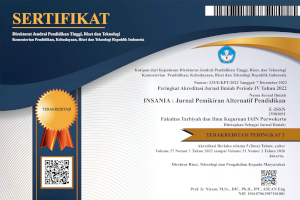The Effectiveness of using Quizlet as digital learning to improve vocabulary mastery of junior high school students
DOI:
https://doi.org/10.24090/insania.v28i1a.8638Keywords:
digital learning media, Quizlet, vocabularyAbstract
The aim of this study is to determine the effectiveness of using Quizlet as a digital learning medium to improve the vocabulary mastery of junior high school students. This study applied a quasi-experimental design with pre-test and post-test. The population of this study consisted of the 8th-grade students of MTsN 1 Kota Makassar. Purposive sampling was utilized by the researchers to choose 80 students as a sample and divided them into two classes, experimental and controlled classes. This study used a vocabulary test as the instrument. The vocabulary test was used to determine whether the 'students' vocabulary mastery had improved following the treatment or not. The result of the study shows that there was improvement of 'students' vocabulary after using Quizlet as digital learning media. This is evidenced by the t-test significant value 0.000<0.05, which means that H1 is accepted and H0 is rejected. Therefore, using Quizlet as digital learning media is effective to improve 'students' vocabulary mastery. Quizlet is one of application that can be used as digital learning media with many features that can support the learning process in individuals and groups. Quizlet can also be used in online and offline situations.Downloads
References
Anjaniputra, A. G., & Salsabila, V. A. (2018). The Merits of Quizlet for Vocabulary Learning at Tertiary Level. Indonesian EFL Journal, 4(2), 1-11. https://doi.org/10.25134/ieflj.v4i2.1370
Apriliani, D. N., & Suryaman. (2021). 'Students' Perception in Learning English Vocabulary Through Quizlet. Journal of English Teaching, 7(3), 343-353. https://doi.org/10.33541/jet.v7i3.3064
Avisteva, R. T., & Halimi, S. S. (2021). The Use of Quizlet as a Vocabulary Acquisition Learning Media for Eleventh Grade Students. Proceedings of the International University Symposium on Humanities and Arts 2020 (INUSHARTS 2020), 254-260. https://doi.org/10.2991/assehr.k.211110.038
Buckingham, D. (2003). Media Education : Literacy, Learning, and Contemporary Culture. Polity Press.
Çinar, İ., & Arı, A. (2019). The Effects of Quizlet on Secondary School 'Students' Vocabulary Learning and Attitudes Towards English. Asian Journal Instruction, 7(2), 60–73. https://dergipark.org.tr/en/pub/aji/issue/51548/647002
English First EPI. (2022). Daftar peringkat terbesar berdasarkan kemampuan bahasa Inggris di negara dan wilayah terbesar dunia. https://www.ef.co.id/epi/regions/asia/indonesia/
Harmer, J. (2007). How to Teach English. Pearson Education Limited.
Hatch, E., & Brown, C. (1995). Vocabulary, Semantics, and Language Education. Cambridge University Press.
Johnson, R. B., & Christensen, L. (2014). Educational Research. SAGE.
Kementerian Pendidikan, Kebudayaan, Riset, dan Teknologi. (2013). Salinan Peraturan Menteri Pendidikan Dan Kebudayaan Republik Indonesia Nomor 68 Tahun 2013.
Lin, M. H., Chen, H. C., & Liu, K. S. (2017). A study of the Effects of Digital Learning on Learning Motivation and Learning Outcome. Eurasia Journal of Mathematics, Science and Technology Education, 13(7), 3553–3564. https://doi.org/10.12973/eurasia.2017.00744a
Montaner-Villalba, S. (2019). The Use of Quizlet to Enhance Vocabulary in The English Language Classroom. In CALL and complexity – short papers from EUROCALL 2019 (pp. 304–309). Research-publishing.net. https://doi.org/10.14705/rpnet.2019.38.1027
Okkan, A., & Aydın, S. (2020). The Effects of the Use of Quizlet on Vocabulary Learning Motivation. Language and Technology, 2(1), 16–25. https://dergipark.org.tr/tr/download/article-file/970416
Prayogi, A. W., & Wulandari, M. (2021). Implementing a Mobile Application Quizlet to Help Senior High School Students Learn Vocabulary. Journal of English Language Teaching, 6(1), 87-99. https://doi.org/10.15294/elt.v10i1.42775
Quizlet. (2015). What is Quizlet. https://quizlet.com
Raharjo, S. (February 19, 2014). Cara Melakukan Uji Normalitas Kolmogorov-Smirnov dengan SPSS. SPSS Indonesia. http://www.spssindonesia.com/2014/01/uji-normalitas-kolmogorov-smirnov-spss.html
Setiawan, M. R., Pancoro, N., & Putro, S. (2021). Quizlet Application Effect on Senior High School Students Vocabulary Acquisition. English Language and Literature International Conference (ELLiC) Proceedings, 4, 84-98. https://jurnal.unimus.ac.id/index.php/ELLIC/article/view/7392
Setiawan, M. R., & Wiedarti, P. (2020). The effectiveness of quizlet application towards 'students' motivation in learning vocabulary. Studies in English Language and Education, 7(1), 83–95. https://doi.org/10.24815/siele.v7i1.15359
Stauffer, B. (July 23, 2019). Pros & Cons of Using Quizlet in Your Classroom. iCEV. https://www.aeseducation.com/blog/quizlet-pros-cons
Sugiyono. (2017). Metode Penelitian Kuantitatif, Kualitatif, dan R&D. Alfabeta.
Wright, B. A. (2016). Transforming Vocabulary Learning With Quizlet. Japan Association for Language Teaching Postconfrence Publication, 1, 436-440. https://jalt-publications.org/node/4/articles/6075-transforming-vocabulary-learning-quizlet
Downloads
Published
How to Cite
Issue
Section
License
Copyright (c) 2023 Serliah Nur, Nurhalisa Eka Putri

This work is licensed under a Creative Commons Attribution-ShareAlike 4.0 International License.
Authors who publish with this journal agree to the following terms:
Authors retain copyright and grant the journal right of first publication with the work simultaneously licensed under a Creative CommonsAttribution-ShareAlike License that allows others to share the work with an acknowledgment of the work's authorship and initial publication in this journal.
Authors are able to enter into separate, additional contractual arrangements for the non-exclusive distribution of the journal's published version of the work (e.g., post it to an institutional repository or publish it in a book), with an acknowledgment of its initial publication in this journal.
Authors are permitted and encouraged to post their work online (e.g., in institutional repositories or on their website) prior to and during the submission process, as it can lead to productive exchanges, as well as earlier and greater citation of published work (See The Effect of Open Access).








